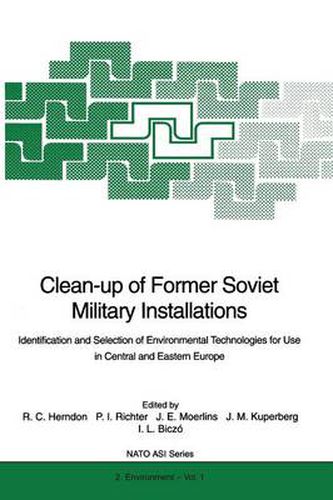Readings Newsletter
Become a Readings Member to make your shopping experience even easier.
Sign in or sign up for free!
You’re not far away from qualifying for FREE standard shipping within Australia
You’ve qualified for FREE standard shipping within Australia
The cart is loading…






This title is printed to order. This book may have been self-published. If so, we cannot guarantee the quality of the content. In the main most books will have gone through the editing process however some may not. We therefore suggest that you be aware of this before ordering this book. If in doubt check either the author or publisher’s details as we are unable to accept any returns unless they are faulty. Please contact us if you have any questions.
A NATO Advanced Research Workshop (ARW) was conducted on June 21-23, 1994 in Visegnid, Hungary related to the clean-up of former Soviet military installation sites. This ARW included a technical site visit to the Komarom Base Site which is a former Soviet military installation in Hungary. During this three-day ARW, a strategy and set of recommendations were developed for selecting technologies and evaluating remediation as the economic and approaches for these sites. This strategy incorporated such critical issues financial conditions of the region, temporal considerations with regard to the urgency for which remedial actions are needed for these sites, the prioritization of resource allocations for site clean-up using risk-based considerations, and other crucial issues which will affect the implementation of remedial activities in the region. Approximately 40 invited experts, representing a number of different disciplines as well as both NATO and Cooperation Partner countries from the region, participated in this ARW. The types of former Soviet military installations in Central and Eastern Europe include: aircraft bases, fueling areas, maintenance and repair facilities, training grounds, non ammunition storage areas (for lubricants, chemicals, paints, equipment), ammunition storage areas, medical facilities, production facilities, and municipal facilities. Environmental contamination at these sites poses significant human health and environmental risks. Site contaminants include: solvents (e. g. , BTEX), mineral oil hydrocarbons, polycyclic aromatic hydrocarbons (PAHs), chlorinated hydrocarbons, heavy metals, pesticides residues, and polychlorinated biphenyls (PCBs). The primary environmental media adversely affected by these contaminants are soils, ground water and surface water.
$9.00 standard shipping within Australia
FREE standard shipping within Australia for orders over $100.00
Express & International shipping calculated at checkout
This title is printed to order. This book may have been self-published. If so, we cannot guarantee the quality of the content. In the main most books will have gone through the editing process however some may not. We therefore suggest that you be aware of this before ordering this book. If in doubt check either the author or publisher’s details as we are unable to accept any returns unless they are faulty. Please contact us if you have any questions.
A NATO Advanced Research Workshop (ARW) was conducted on June 21-23, 1994 in Visegnid, Hungary related to the clean-up of former Soviet military installation sites. This ARW included a technical site visit to the Komarom Base Site which is a former Soviet military installation in Hungary. During this three-day ARW, a strategy and set of recommendations were developed for selecting technologies and evaluating remediation as the economic and approaches for these sites. This strategy incorporated such critical issues financial conditions of the region, temporal considerations with regard to the urgency for which remedial actions are needed for these sites, the prioritization of resource allocations for site clean-up using risk-based considerations, and other crucial issues which will affect the implementation of remedial activities in the region. Approximately 40 invited experts, representing a number of different disciplines as well as both NATO and Cooperation Partner countries from the region, participated in this ARW. The types of former Soviet military installations in Central and Eastern Europe include: aircraft bases, fueling areas, maintenance and repair facilities, training grounds, non ammunition storage areas (for lubricants, chemicals, paints, equipment), ammunition storage areas, medical facilities, production facilities, and municipal facilities. Environmental contamination at these sites poses significant human health and environmental risks. Site contaminants include: solvents (e. g. , BTEX), mineral oil hydrocarbons, polycyclic aromatic hydrocarbons (PAHs), chlorinated hydrocarbons, heavy metals, pesticides residues, and polychlorinated biphenyls (PCBs). The primary environmental media adversely affected by these contaminants are soils, ground water and surface water.